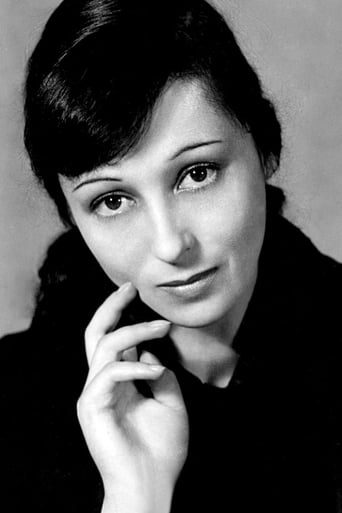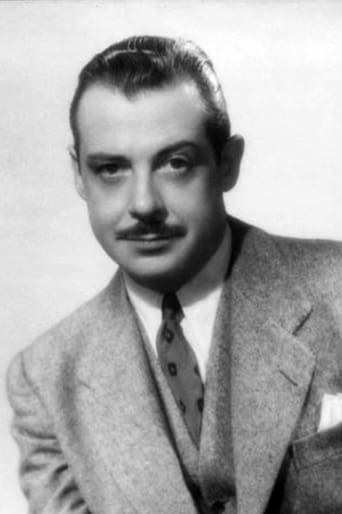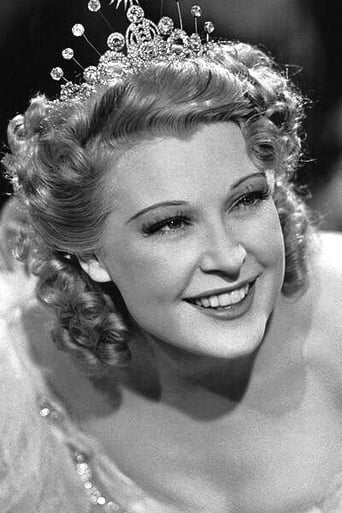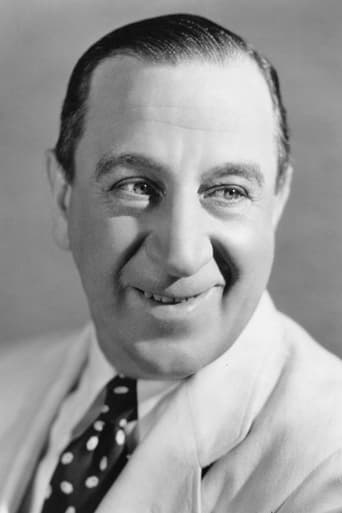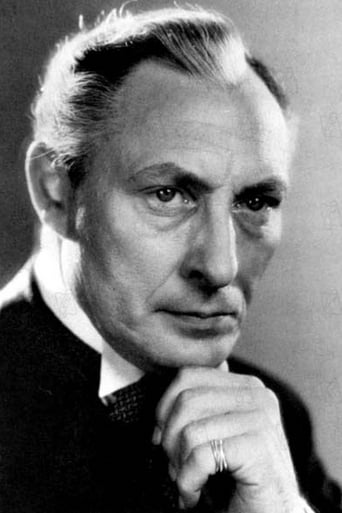Jon Corelis
The Great Walz is a classic "Hollywoodization" bio-pic, one which hardly pretends to be accurate, but which uses the life story of an historical character as a basis for atmosphere and entertainment. In this case the subject is "The Walz King" Johann Strauss II, who was responsible for the craze for the dance that conquered Vienna and much of Europe in the mid 19th century. Made by veteran director Julien Duvivier, who made umpteen films during his long career, most of them forgotten today except for the classic Pepe le Moko, The Great Walz is endearingly filled filled with schmaltz and cliché, and features the absolutely incredible soprano vocals of Miliza Korjus (she was Oscar nominated for best supporting actress.). All in all, an enjoyable light entertainment. I saw this in the Turner Entertainment standard DVD which was of acceptable quality.
lugonian
THE GREAT WALTZ (Metro-Goldwyn-Mayer, 1938), directed by Julian Duvivier, is the studio's contribution to the life and songs by the Waltz King composer himself, Johann Strauss (l825-1899). Following the pattern of MGM's Academy Award winning of the three hour production of THE GREAT ZIEGFELD (1936), this 102 minute edition, as in many musical-biographies, is more fiction than fact. The opening message, which reads: ("In Vienna in 1844, nice people neither danced the waltz … nor kissed their wives in public … nor listened to new ideas. In 1845, came Johann Strauss II and his immortal melodies. We have dramatized the spirit rather than the facts of his life, because it is his spirit that has lived --- in his music") remedies that. European styled production from impressive and stylish camera ranges/angles to director and leading players, feature billing goes to Luise Rainer, two-time Academy Award winner in a secondary performance to the major character played by Fernand Gravet, whose performance dominates the proceedings throughout.In typical Hollywood fashion, so much of the man's life and songs couldn't be depicted to produce an accurate biography. The story begins with young Johann Strauss (Fernand Gravet) getting fired by Mr. Westheimer (Sig Rumann) for composing waltzes on company time. Strauss soon comes to the bakery where Podi Vogelhuber (Luise Rainer) works with her parents (Bert Roach and Greta Meyer). It is Podi who influences "Schani" to form an orchestra and conduct his music publicly. Schani makes his debut at the Casino Donmayer, playing to a near-empty house. Only upon the arrival of Fritz Schiller (George Houston), the first tenor of the Imperial Opera, and singer, Carla Donner (Milza Korjus) does the place fill up to capacity to Strauss's latest waltzes. Later, Johann and Podi marry, followed by his enormous success of his melodies, polkas and marches. Strauss gets his demands of $1,000 per song as opposed to $1,000 a year from Julius Hofbauer (Hugh Herbert), a music publisher. With success comes failure, failure in his troubled marriage through Schani's interest and involvement into the life and career of Carla, much to the displeasure of Count Hohenfried (Lionel Atwill), who loves her.Of the hundreds of Strauss melodies composed during his lifetime, sadly, only a few were selected. There's even new compositions written by Oscar Hammerstein II. Chosen melodies, whether heard as background or complete orchestration include: "The Emperor Waltz," "I'm in Love With Vienna," "There Will Come a Time," "Tales of the Vienna Woods," "One Day When We Were Young," "Only You" and "Revolutionary Air." Let's not forget Strauss classic selections of "Voice of Spring," "Di and Du," "Die Fledermaus" and of course, "The Blue Danube." Fernand Gravet even gets to sing one of the songs listed, and nicely, too. Others in the cast include: Curt Bois (Kienzl); Leonid Kinskey (Dudelman); Al Shean (The Cellist); Minna Gombell (Mrs. Hofbauer); Alma Kruger (Mrs. Strauss); and Henry Hull (Emperor Franz Josef).For anyone expecting accuracy to the story will be disappointed, especially with no depiction of Strauss's family, including his brothers, children and other wives; the fact that Strauss's wife has a fictional name; and not including any frictional scenes between Johann and his composer father in wanting his young son to become a banker rather than a greater composer than himself. Had all these instances been depicted, THE GREAT WALTZ might have turned into another three hour GREAT ZIEGFELD-type spectacle, but at least more accurate material in his life as opposed to Hollywood make-believe. For anyone expecting an entertaining biography would or should be satisfied by the finalized results.Luise Rainer's performance at times is reminiscent to her Academy Award winning performance as Anna Held in THE GREAT ZIEGFELD, especially where expresses happiness in public while holding in her bitter disappointments. There is a long stretch of 25 minutes where she's not on screen, and much more time devoted to Fernand Gravet and Milza Korjus. Though Rainer's greatest role goes to her second Academy Award win of THE GOOD EARTH (1937), there's no Academy Award this third time around. The Academy, however, did honor the best supporting actress category to Milza Korjus instead. While at a distance, she builds a physical resemblance to Jeanette MacDonald, and close-up resemblance to Sonja Henie, her operatic high notes is enough to break glass or crack mirrors. Her most memorable scene occurs in a carriage ride with Strauss through the Vienna Woods, where the composer gets the inspiration to another one of his greatest melodies. Of the three Hollywood movies to feature Gravet, THE GREAT WALTZ is his finest achievement and most memorable. Drawbacks are some of its Americanized dialog, notably Strauss calling his orchestra "worms," and Franz Josef a "stuffed shirt." Hugh Herbert's "woo-woo" performance seems out of place here and should have been played straight or played by accented character actor, Joseph Cawthorn instead. And what MGM movie about classical music doesn't include the German stereotype of Herman Bing such this one? Though a forgotten fact that the story of Johann Strauss was earlier produced in England as WALTZES IN VIENNA (1933), surprisingly directed by Alfred Hitchcock, the Strauss legacy was retold again years later as THE GREAT WALTZ (1972) and more successfully as a television mini-series, "The Strauss Family" (1972-73). The 1937 edition, however, has become available on video cassette and DVD, as well as broadcasts on Turner Classic Movies. To enjoy other great Strauss melodies not used in any of the movies, simply acquire a CD and see why the Strauss name and melodies have survived years after his death. (***1/2)
parusia1936
Great movie that portrays perfectly the era of Franz Joseph I of Austria, and his revolution, although not accurately portrays the composer's biography, (Hollywood never portrays in his movies biographical their true history, altering them for economic and commercial reasons), and such is the case, nevertheless, this wonderful production of the Metro, which shine over all, erecting an actress dominant from start to finish, the great, the incomparable dramatic soprano voice Miliza Korjus, whose presence with overwhelming smile in the main figure of this unforgettable production. beside Fernand Gravey as Johann Strauss is excellent, and as his wife the unforgettable Luise Rainer of "The Good Earth" and "The Great Ziegfeld". brightly made film, and with great merit Oscar winner for best picture. in my opinion is the best musical of all time. note 10 regards
bkoganbing
If it weren't for the fact that The Great Waltz was made at the MGM lot it would have qualified as a foreign film. The three stars were all imports as was the director Julian Duvivier and a great deal of the cast are also foreign born. Nevertheless the cast spoke perfect if accented English. Of course Herman Bing's accent as the proprietor of Dannmeyer's Cafe where the music of Johann Strauss gained its first audience and popularity. But with Fernand Gravey as Johann Strauss you'd never know he was Belgian born and a star of the French cinema of first rank.This is far from the story of Johann Strauss, II. In fact that story would have been really interesting, but instead we got Viennese frou-frou laden with Strauss music. Luise Rainer is Mrs. Strauss, the first one actually, he married again much after the action of this film is done. The film really could be called Strauss, The Early Years. Young Strauss is looking to make good in music like Dad who really disapproves of his son following in the profession. But Rainer supports him all the way, even when he gets himself involved with opera singer and vixen Miliza Korjus.If you think you've seen Rainer in this situation before, you have. Both of her Oscar winning performances in The Good Earth and The Great Ziegfeld involved Rainer as the wronged wife. She did the part well, no one could register hurt on the screen like she could with just a look, but I think she was getting into a typecasting rut. It might have been part of the reason that she left MGM after one more film and Hollywood in general after another film at another studio.As for Miliza Korjus it was well known that Louis B. Mayer never met a soprano he didn't like. I'm betting he signed her to keep Jeanette MacDonald in line. But after this film with plans for another on the boards she got involved in a serious automobile accident and after she recovered she just went back to the concert stage. Fernand Gravey only made a few films in America, he went back to France after this one and just in time to be caught up in the Nazi occupation.To give Korjus some music to sing the Strauss music was given lyrics by the best man around to do that, Oscar Hammerstein, II. The Great Waltz got an Oscar for cinematography and nominations for editing and for Best Supporting Actress for Miliza Korjus. Truth be told she seemed to have just as much screen time as Rainer.But of course the main attraction of The Great Waltz is the music of Johann Strauss. Good enough reason to see this movie.

